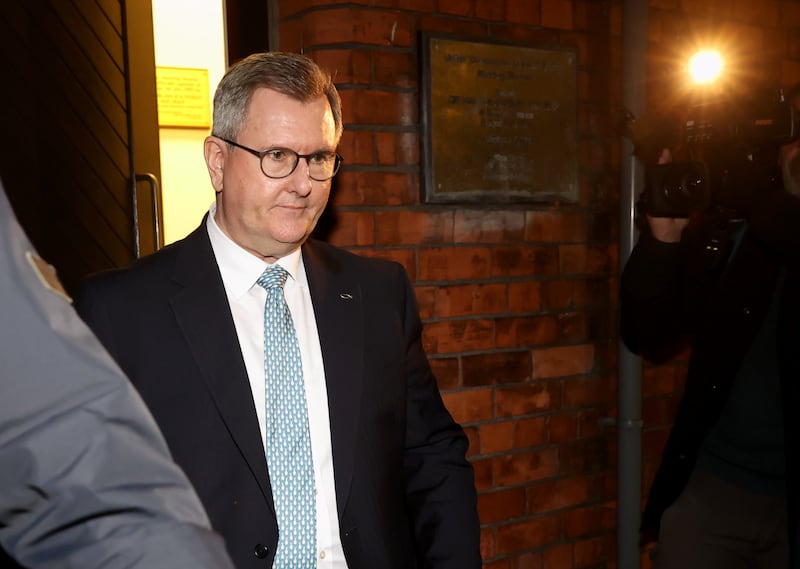The deal is done. The devolved institutions have been restored. There is cautious optimism that we can finally move on and address the priorities that matter to most people: a health service out of control, crumbling schools, a cost-of-living crisis and a moribund economy.
Given the stagnation and decay it is understandable that the prevailing view is bad government is better than no government. There are no champagne corks popping, no celebrations, just a weary resignation that this seems to be as good as it gets.
After a two-year political hiatus, it is however important to reflect on how we got here and what it means for the accepted political norms. The DUP’s decision to resume power-sharing marks the end of a long, murky, grubby process overseen by the British government. This can be viewed as a political drama in two parts.
Firstly, the collapse in 2022. After months of threats, the DUP finally walked away from the power-sharing institutions. Jeffrey Donaldson announced that if the choice was remaining in office or implementing the protocol, then the only option for any unionist minister would be to cease to hold such office. A reckless irresponsible move that condemned Northern Ireland to limbo.

This was not the only option. The protocol was far from perfect. There were legitimate concerns, but these could have been addressed within the operational framework that had been agreed.
Having acted in extremely bad faith, the British government embarked on a two-year ‘talks’ process with the DUP in an attempt to make the protocol arrangements more palatable. Everyone else simply watched on as Jeffrey went back and forth to London.
As a political process this was an aberration. A clandestine, bilateral process with the objective of appeasing the hard-right in unionism. Blatantly flying in the face of accepted principles on equality and mutual respect.
No-one knew what was being discussed, who were in the talks and what was on the table. Yet this completely abnormal, bizarre process, where other political actors including the Irish government were frozen out, was normalised. There was no outrage that the British government had not instigated multi-party talks to reach a compromise. We just sat on our hands, waited for pronouncements on progress and hoped that an endgame would finally be in sight.
Secondly, the deal. In the early hours of Tuesday morning, the DUP leader announced that his party had accepted a deal that would pave the way for a return to Stormont. No-one else had sight of the agreement and could only speculate what it might contain.

On Wednesday, the deal was finally published in the guise of an extraordinary command paper entitled “Safeguarding the Union”. For the avoidance of any doubt about the intended audience, it helpfully came with a red, white and blue cover.
This 80-page document is completely one-sided and partisan, with not even a pretence that it was anything other than a sop to unionism. Much of the content is window-dressing and padding, with about two pages of any substance. Heavy with spin, jaundiced and gratuitously insulting to non-unionists.
This command paper is twice as long as the Windsor Framework and is little more than an exercise in convincing unionists that they are valued and cherished. Laden with adjectives such as ‘important’ and ‘significant’, in a crass nod to our shipbuilding past, it commits to ‘copper-fasten’ Northern Ireland’s place in the United Kingdom no less than five times.
If the British government is content to unilaterally abandon its long-standing commitments, it may be just replacing a crisis in unionism with a crisis in nationalism
Announcing the deal in parliament, Chris Heaton-Harris stated that the Conservatives were the “party of the union”. His declaration that any change in the constitution would absolutely depend on the consent of both communities at the time was greeted with howls of derision. Did he really not understand the Good Friday Agreement, or was this an awkward attempt at a sleight of hand? His promotion of this ‘great deal’ at a joint press conference with Jeffrey Donaldson in Hillsborough was truly remarkable. Could you imagine the secretary of state holding a joint conference with Sinn Féin?
Throughout this period of collapse the British government completely abandoned any pretence of rigorous impartiality. This sets a very dangerous precedent. If at some point in the future the DUP are unhappy, can they demand and expect bilateral talks?
If the British government is content to unilaterally abandon its long-standing commitments, it may be just replacing a crisis in unionism with a crisis in nationalism.




